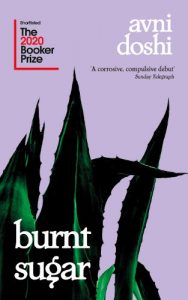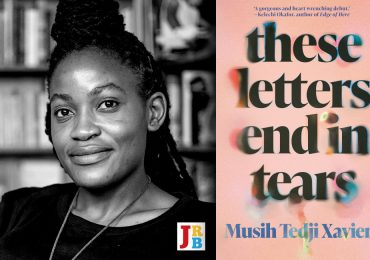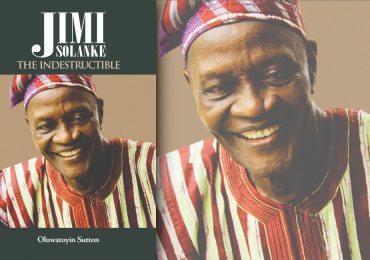Wamuwi Mbao reviews Avni Doshi’s Booker Prize-shortlisted novel Burnt Sugar.

Burnt Sugar
Avni Doshi
Penguin, 2020
The rather selfish belief that one’s parents always have one’s best interests at heart invariably gives rise to the kind of disillusionment echoed most often in Philip Larkin’s iconic poem, ‘This Be the Verse.’ You know the one. (If you don’t, speak about your parents’ failings around any English literature graduate over the age of twenty-five.) The process of grieving for the imminent loss of the first adult in whom one invests any significant emotional attachment is particularly rending if the parent is estranged, and further heightened if the estranged parent is one’s mother. Fathers are invariably disappointers at one remove from the scene of childhood, whereas one’s mother is one’s first buffer and confidant, and so one’s first betrayer when she exposes our false familiarity by deigning not to conform to our rigid idea of who she is.
This, you might say, does not make for particularly cheery contemplation. And yet in Avni Doshi’s Burnt Sugar (a rather better title than the unpromising Girl in White Cotton under which it goes in India), the discrepancy between how a daughter and mother remember the intertwining of their lives becomes a diagnostic narrative that traces generational wounding in 229 pages of clipped, intensely personal prose. In the age of big, costive novels, Burnt Sugar is a blessedly lithe novel on a Booker shortlist that often groans with wordy overstuffed doorstops.
The novel is narrated by Antara, a middlingly successful thirty-something artist who lives in Pune in western India with her husband Dilip. It broadly spins around the matter of Antara’s fraught relationship with her mother Tara. The daughter (who is the mirror negative of her mother, the un-Tara) exists in a state of deep internal conflict occasioned by the feeling that her mother will live out her days without being made to account for the damage she caused her child:
The reason is simple: my mother is forgetting, and there is nothing I can do about it. There is no way to make her remember the things she has done in the past, no way to baste her in guilt. I used to bring up instances of her cruelty, casually, over tea, and watch her face curve into a frown. Now she mostly can’t recall what I’m talking about; her eyes are distant with perpetual cheer.
Antara hovers before the prospect of having to assume responsibility for Tara, rebuked by her own sense of guilt, and resentful that others (her partner, doctors) will not understand her cool reception towards her mother. The doctor they consult insists that her brain is working fine, and her husband behaves as though nothing is wrong with Tara, because he doesn’t know any better. But for Antara, the frustration is all the more terrible because she seems to be the only one who sees it:
[…] the mother I remember appears and vanishes in front of me, a battery-operated doll whose mechanism is failing. The doll turns inanimate. The spell is broken. The child does not know what is real or what can be counted on. Maybe she never knew. The child cries.
Tara’s early-onset senility is distressing for Antara because illness is the great homogenizer, stripping back everything particular and divesting the loved one of their identity via a series of embarrassing episodes. A restless character whose rebellion against the roles she was expected to play comes at high cost, Tara’s longstanding neglect of her daughter is brought into sharp focus when her increasingly perforated mind compels Antara to keep closer tabs on her.
What follows is an unsettling foray into the tangle of the women’s lives. Is Antara right to feel aggrieved at the suffering she experienced at the hands of her mother? Certainly, Tara is a robustly self-interested character rendered suddenly vulnerable by her dementia, and she bluffly deflects her lack of care for the young Antara as part of a past she has no wish to relive. This past includes her leaving Antara’s father and taking refuge in an ashram headed by a mendaciously predatory guru, to whom she gives all her attention until she is spurned for a younger devotee. While Tara devotes herself to the guru, the infant Antara is left to fend for herself. Later, the adult Antara will fret over what her mother (who is a gaslighter of note) chooses to forget. We see that what Antara deems significant may or may not have any particular meaning for her mother, and here the novel’s key point opens out to us.
Burnt Sugar reminds us that childhood is an idea about the relationship of children to adulthood that was invented by adults to account for their neuroses. What one remembers of one’s past from the vantage point of an adult is always hued by the actions of the adults who disappointed us most deeply with their drunken, psychopathic, dishonest or cruel actions. Antara’s attempts to slow her mother’s slide into dementia via reminders, cue cards, retellings and other performances of memory, are also attempts to align their understanding of events to one unified narrative, the better to make her mother understand what she has done wrong. This forms the base note of a narrative that flits between past and present through Antara’s free association. The more detail Antara provides about her mother, the more we are presented with a picture of her own unravelling.
It is childhood hurt that Antara is most caught up in remembering. When Tara abruptly takes her leave of the ashram, having been spurned by the guru in favour of a younger lover, the defiant mother and hapless daughter spend their days in unseemly squalor, begging outside the club whose patrons regard them with the mixture of pity and contempt the middle classes often reserve for those who remind them of how easy it is to fall into ruin.
Rescued from this depressing fate by her maternal grandparents, Antara subsequently endures a spell in a boarding school where she forms a sputtering, unstable friendship (one of the novel’s interesting strands is Antara’s connections with other women, which either sever abruptly, or peter out in confusion and misunderstanding) and develops an eating disorder. Food recurs in the novel as a site of acceptance or rejection: we can easily trace an arc from Tara leaving her infant daughter unfed as she attends to the guru, through to Antara’s distending of her mother with sugar at the end of the novel.
Ironically, though it is her mother whose health is in question, it is Antara who ceaselessly cycles through the past, as she tries to reconcile Tara’s behavior with the expectations that accrue to the role signified by the title ‘mother’. Anger flares up at surprising points between them, as we steadily begin to discern the contours of their disagreement. Our sympathy swings between mother and daughter: Antara is a narrator whose reliability undulates unpredictably, and the question of apportioning blame becomes ever less discernable the more we learn about both women.
In Burnt Sugar, one of the more interesting conversations is about how gender roles scribble over the picture we are looking at. The men—Dilip, Antara’s father, the guru Tara absconds with—are repellently ineffectual: self-absorbed, boastful, completely and often wilfully oblivious, they drift through the story contributing little. Dilip, an Americanised migrant who traffics in cheerful banalities and goes through the world untroubled by complex thoughts, might as well be in a different novel. Antara’s mounting frustration with him, which is pithily rendered via Doshi’s wry understatement, has no outlet because the society in which they reside is built up around the unquestioned belief in masculine superiority. This often filters through in moments that provoke a rueful laugh. Leaving the doctor’s office after a frustrating consultation, the doctor asks them if they are related to a male doctor at a hospital in Bombay. ‘I tell him we aren’t,’ Antara reports, ‘and he looks disappointed, sad for us. I wonder if inventing a relation could have helped.’
Doshi’s writing picks at the seams of a broader social problem. Antara, Dilip and their friends are composite characters who belong to a generation poised to benefit from the quiet struggles of their parents: Burnt Sugar does not detour through the postcolonial struggle gallery. When Antara and her cohort socialise, they do so at a formerly colonial club that, though it may physically recall the British Raj, has become something else as well. But they also belong to a generation that threatens to disappoint the deeply cherished notions of advancement held by their parents, for whom moving to the West and settling in bland assimilation is the ultimate achievement.
Ironically, the mother who deeply desires to be unencumbered from the burden of Antara’s love, finds her daughter once more tangling around her legs. When Antara, in a moment of pique, rebukes her mother for only thinking of herself, Tara blocks the j’accuse coolly: ‘There’s nothing wrong with thinking about oneself.’ Her refusal and inability to take on the shame of her bad mothering redirects us to think about Antara’s own motivations. She is not an especially reliable narrator, and her anxiety around the life she is taking on with Dilip seems to express an unexamined internal conflict over what responsibilities are created by bonds of love.
Thus, we see how Antara initially kicks against the self-satisfied nullity of being attached to someone safe in your thirties, with children and late-capitalist aesthetic oblivion looming. But eventually, the orthodox regimes exert enough of their superstitious pull on her that they seem to be the only barriers keeping Antara from hurtling into an abyssal darkness. Nobody wants to die alone. It is at moments like this that the novel is at its strongest: the author’s texturing of the relations between people resists solipsism, reminding one of the similar moments in the work of authors like Sheila Heti or Kate Zambreno. But where those writers are purveyors of a distinctly vanilla white-girl mode, Doshi’s eye picks out the absurdities and redescribes them for our noticing. The effect is pleasantly vivid.
Doshi is also an acute observer of class distinctions. The retinue of workers who staff and supply care are corrosively mute in their interiority. The child Antara forms a bond with a young woman who is hired to nurse her, but when Antara tries to follow the woman beyond the boundaries of the middle-class domicile, she is abruptly rebuffed, a scuffle ensues and the young woman is fired. Later in the story, Antara reacts with fear and dismay when she realises that her mother’s infirmity has been seen by the watchman of the building in which she lives, making her an easy target for the feral proletariat Antara conjures from her imagination.
Devotees of a certain kind of contemporary fiction will immediately recognise the writing mode, which is quietly aphoristic, laconic in temperament, lean in dialogue, and imitative of actuality’s fragmentations in a manner that risks becoming a convention. India is moist, polychromatic and febrile, sex is appended unremarkably to the end of paragraphs, and the mundane becomes a means of proliferating detail:
The clock on the wall of the doctor’s office demands my attention. The hour hand is on one. The minute hand rests between eight and nine. The configuration remains this way for thirty minutes. The clock is a fading remnant of another time, broken down, never replaced.
The ennui swells out of uninteresting, and ennui, so we are often told, is an interesting form of boredom. It works here, but at other times the pose feels a little too solipsistic: is borborygmy interesting? At another point, we witness Antara looking up the chemical composition of her mother’s pills, which she describes as ‘a series of elegant hexagons, and a molecule of hydrogen chloride hanging off like a tail’. You can spot the riff coming. Cliché is hardly the worst crime, but it seems clunky, here, and it makes characters in whose mouths it occurs less believable than they might be.
While Doshi’s prose is otherwise admirably smooth and uncatching, the final third of the novel goes a bit baggy, as though the tension that has held the story taut in its first and second phases cannot be sustained any longer. The ending is a surprise, but because that vital energy has sagged somewhat, it isn’t delivered with quite the polish it deserves. Instead, we lurch through a scene that seems too generic for such a tightly constructed piece of fiction.
As meditations on family ties go, Burnt Sugar is decidedly capacious for its relative brevity. Its sparseness won’t be to all tastes (but then, what is?), but the neatness of the writing, when combined with the lurid overflow of life, produces an oddly moving piece of fiction.
- Wamuwi Mbao is an essayist, cultural critic and academic at Stellenbosch University. Follow him on Twitter.





